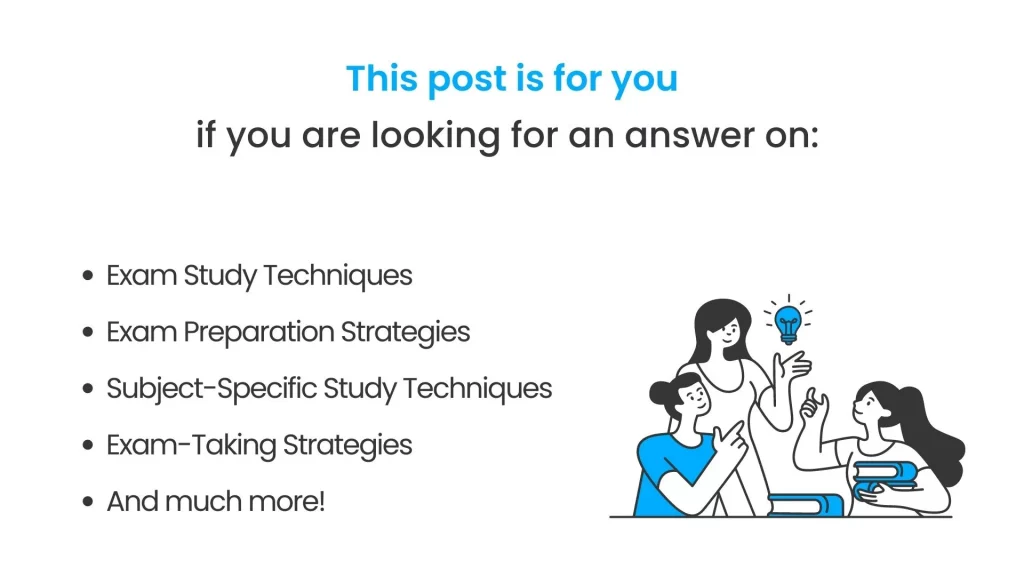Exam preparation may be a demanding and stressful process, particularly when there is a lot of information to cover and little time available. You may succeed in your test preparation, nevertheless, if you use the proper strategy and study methods. In this blog post, we shall be looking at the various tips and tricks that will clear your doubts about how to study for exams. We want to provide you with the resources you need to ace your examinations, whether you’re a student or an adult returning to school.
To help you perform to your maximum ability, we will cover every facet of exam preparation, from making a study plan and setting goals to remaining motivated and focused. No matter what kind of test you’re taking—a final, a standardized test, or a certification exam—our in-depth guide will provide you with the direction and encouragement you need to do well. Read on to learn the secrets of efficient test preparation if you’re ready to take the first step toward passing your examinations.
Topics covered
What all is covered in this post?
To make it easier for you, we have created a quick guide to everything you need to know about the tips and strategies on how to study for exams.

Exam Study Techniques
The preparatory phase of any examination is quite crucial as it is the most important driving factor. The majority of your succeeding chance depends on the preparatory phase. Students must plan their preparatory phase well. The following are some efficient exam study methods that will help you withdraw the best of this phase:
- Plan your study time: Plan out when and how you will study each topic, and try your best to keep to it.
- Remain arranged: You can keep track of the information you need to memorize by using outlines, flashcards, or other study tools.
- Recall: Instead of merely going over your notes, try to actively recall the content.
- Practice exams: Take practice exams to familiarise yourself with the exam environment and determine any subject areas that require more study.
- Teach someone else: Make an effort to impart knowledge to someone else. This might aid in clarifying your comprehension and pointing out any knowledge gaps you may have.
- Take adequate sleep: So that you are well-rested for the exam, be sure you obtain adequate sleep.
- Stay calm: On the day of the exam, try to be calm and unhurried. Also, don’t forget to eat a nutritious breakfast.
Exam Preparation Strategies
One of the most important aspects of succeeding academically is exam preparation. You may successfully prepare by using the following methods:
- Start Early: Don’t put off starting your studies until the last minute. Starting early allows you to evaluate the whole course material and prevents you from being overly stressed.
- Plan your study time: Plan out when and how you will study each topic, and try your best to keep to it. This will enable you to efficiently prioritize your learning and allot appropriate time for each topic.
- Stay Organized: Use outlines, flashcards, or other study tools to keep track of the information you need to memorize to stay organized. Finding what you need when you need it will be simpler if your study materials are arranged.
- Practice active recalling: Instead of merely going over your notes, try to actively recall the content. This will improve your memory of the material and help you prepare more effectively for the test.
- Test-taking tips: Take sample exams to familiarise yourself with the format of the real exam and determine which topics require extra study. You’ll become more comfortable with the exam’s format and feel more confident on test day as a result.
- Sleep Properly: So that you are well-rested for the exam, be sure you obtain adequate sleep. Your capacity to focus and recall information may be affected by sleep deprivation.
- Stay calm: On the day of the exam, try to maintain your composure and relaxation. To prevent feeling hurried, don’t forget to have a good breakfast and come early to the exam site.
These pointers will certainly help you gain good marks in any examination you are looking for. For more details, read our blog post on How to get good marks in the examination.
Subject-Specific Study Techniques
Subject-specific study techniques are very important since different subjects have different ways of studying. Some subjects require effort in practice while others require the retention of intention. However, let’s study the different techniques for different subjects. The sort of subject you are studying will determine the type of study methods you should use. However, the following basic advice is applicable to all subjects:
- Understand the exam’s structure: This will enable you to adjust your study methods properly. Exam formats include multiple choice, essay, and others.
- Break-down of the content: Make the content more approachable by breaking it up into smaller portions and concentrating on each component separately. This helps you recall the knowledge better and makes the content easier to process.
- Visual aids: To help you comprehend the subject matter better, use visual aids like charts, mind maps, and diagrams.
- Practice, practice, practice: You’ll do better on the test the more you prepare. This holds true for disciplines like math, physics, and languages.
- Use mnemonics to help you recall information: Mnemonics are memory aids. You may use an acronym to recall significant dates and events in history, for instance.
- Engage with the content: Make an effort to actively engage with the content by posing inquiries, taking part in conversations, and elaborating on it to others.
- Use different materials: Use a variety of study resources Make use of a range of study tools, such as books.
Time management skills are essential for exam preparation. Setting clear study objectives and putting out a thorough study plan is essential for getting the most out of your study time and reducing stress. Detailed tasks, deadlines, and the amount of time you wish to spend on each subject should all be included in your plan. It’s crucial to follow your study plan and stay focused while learning. Take regular pauses and treat yourself when you attain a goal or finish a job to keep motivated and focused.
To maintain your body and mind in top shape, be sure to get enough sleep, exercise frequently, and eat a balanced diet. You may maximize your study time and succeed on your examinations with a well-structured study strategy and efficient time management.
Exam-Taking Strategies
While you know every tip and trick before the exam, the most important phase is the ‘Exam Phase” itself. The students must not lose their calm while attempting the examination. Here are some suggestions to improve your exam performance:
- Read instructions: Before you begin, make sure you are familiar with the exam’s structure, the number of questions, and the time allotted.
- Time management: Spend your time carefully, and leave enough time to go over your responses.
- Respond to simple inquiries first: To increase your score and gain confidence, start with simple questions.
- Examine the query carefully: Before responding, thoroughly read each question and ensure that you understand it.
- Show your work: If the test allows it, do so to show that you understand the content. Even if your final answer is erroneous, you may still receive some credit for your effort.
- Keep your composure: Remain composed and concentrated during the exam, and try not to lose heart if you come across a challenging question.
- Take breaks: If you’re feeling worn out or stressed, take a little pause to relax and refocus.
Conclusion
An organized strategy and a dedication to regular work are necessary while studying for tests. Make a study regimen, note your skills and limitations, and break down difficult subjects into digestible chunks to get started. Use efficient study methods to help you remember what you’ve learned, such as active recall, practice exams, and summarising. Don’t overlook the value of self-care and taking breaks to prevent burnout. You’ll be well on your way to acing your examinations and accomplishing your academic objectives by paying attention to these suggestions.
Hope we would have been able to provide you with all the information that you need regarding the tips and tricks on how to prepare well for exams. Still, got questions? Why don’t you connect with our industry experts? Yes, you read it right! You can get your queries resolved in just 60 seconds from our Career counselors. So, what are you waiting for? Download the app now!
iDreamCareer has helped millions of young minds like you from 9th class, 10th class, class 11, and class 12 discover their true mettle and is ready to help you too.
Also, Read
- Complete Details on How to get Good Marks
- How to Increase IQ Level
- Aptitude Tests: Types, Syllabus, and Tips
- Top 10 Toughest Exams in India
- How to Get Interested in Studies
- IPU CET 2023
- How to Improve Communication Skills
FAQs
Active recall, practice tests, summarization, and spaced repetition are some effective study techniques for exams.
To create a study schedule, break down your study materials into smaller chunks, allocate specific times for each subject, and prioritize your most challenging topics.
The amount of time you should dedicate to studying for exams depends on several factors, including the number of exams, the difficulty of the material, and your personal learning style. A general rule of thumb is to study for at least 2-3 hours per exam per week.
If you get stuck on a difficult topic, try breaking it down into smaller parts, seeking help from classmates or a tutor, or using additional resources such as textbooks or online videos.
Self-care is important while studying for exams because it helps you avoid burnout and maintain a healthy mental and physical state. Taking breaks, engaging in physical activity, and eating a balanced diet are all important components of self-care.

Sushant, an accomplished content writer at iDreamCareer, has dedicated his life to the pursuit of writing since childhood. Having earned his education at the prestigious University of Delhi, he possesses a profound understanding of both arts and science in the field of education. Leveraging his professional experience, Sushant brings a fresh perspective to analyzing emerging trends in the realms of writing and education. His youthful mindset, coupled with a positive outlook, is geared towards enlightening students through the impactful delivery of wisdom and knowledge.


















